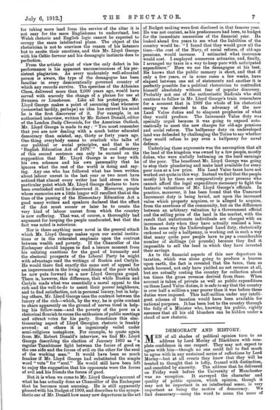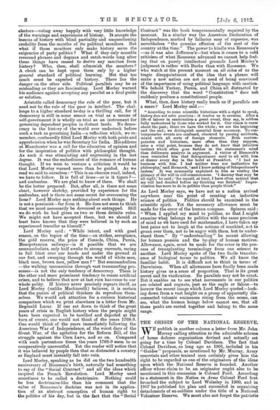DEMOCRACY AND HISTORY.
MEN of all shades of political opinion turn to an address by Lord Morley of Blackburn with com- plete confidence in one respect. They may not expect to agree with him—though no one could fail to find much to agree with in any sustained series of reflections by Lord Morley—but at all events they know that they will be treated to thought that is lofty, framed with distinction, and ennobled by sincerity. The address that he delivered on Friday week before the University of Manchester was no exception. It surveyed the character and quality of public opinion, which opinion, though it may not be important in an intellectual sense, is very important as being the motive of democracy. We find democracy—using the word to mean the mass of electors—voting away happily with very little knowledge of the warnings and experiences of history. It accepts the lessons of history with blind partiality and unquestioning credulity from the mouths of its political monitors. But what if those monitors only make history serve the exigencies of party politics ? What if they only mumble reverend phrases and dogmas and catch-words long after these things have ceased to derive any sanction from history? Who, then, shall admonish the monitors ? A check can be kept upon them only by a higher general standard of political learning. Not that too much must be expected of history. There lies the danger on the other side. Political parallels may be as misleading as they are fascinating. Lord Morley warned his audience against accepting any parallel as a final guide or solution.
Aristotle called democracy the rule of the poor, but it need not be the rule of the poor in intellect. The chal- lenge to a higher standard to-day is a thrilling call, for if democracy is still in some senses on trial as a means of self-government it is wholly on trial as an instrument for governing dependent peoples in distant lands. No demo- cracy in the history of the world ever undertook before such a task as governing India—a reflection which, we re- member, confessedly filled Lord Morley with both pride and apprehension when he was Secretary for India. His address at Manchester was a call for the education of opinion and for the inspiration of politics with philosophic thought. As such it was stimulating and engrossing in the last degree. It was the embodiment of the romance of human thought. If we were to venture a criticism it would be that Lord Morley warned more than he guided. As we read we said to ourselves : " This is an obscure road, indeed, we have to follow. It is full of lions—or is it tigers ?- and ambushes. We are glad to know of them. We shall be the better prepared. But, after all, is there not some chart, however sketchy, provided by experience for the ambushes, and is there not some secret for overcoming the lions ? Lord Morley says nothing about such things. He is not a pessimist—far from it. He does not seem to think that we must necessarily be devoured or entrapped. Still we do wish he had given us two or three definite rules. We might not have accepted them, but we should at least have known that they were believed in by such an experienced traveller as himself."
Lord Morley said : " While intent, and with good reason, on the topics of the time—on strikes, aeroplanes, the gold reserve, the price of Consols, China, Persia, Mesopotamian railways—is it possible that we are somnambulists, only half awake to strong currents, racing in full blast over our heads and under the ground at our feet, and sweeping through the world of white men, black men, brown men, yellow men ?" But somnambulism —the walking unconscious through vast transmuting pro- cesses—is not the only tendency of democracy. There is the other and more prominent tendency to create artificial crises, and to believe that now at last ruin has come to our whole polity. If history never precisely repeats itself, as Lord Morley (unlike Machiavelli) believes, it is certain that the panics of political thinkers do reproduce them- selves. We would ask attention for a curious historical comparison which we print elsewhere in a letter from Mr. Reginald Lucas. If one sat down to think of the great years of crisis in English history when the people might have been expected to be terrified and dejected at the turn of events, one would not think of the years 1768-9. One would think of the years immediately following the American War of Independence, of the worst days of the Great. War, of the agitation for the Reform Bill, of the struggle against the Corn Laws, and so on. Compared with such portentous times the years 1768-9 seem to us comparatively uneventful. Yet the reader will notice that it was believed by people then that so distracted a country as England must instantly fall into ruin.
Lord Morley, speaking as he did on the two hundredth anniversary of Rousseau's birth, naturally had something to say of the " Social Contract " and all the ideas which inspired the French Revolution. Lord Morley used sometimes to be called a doctrinaire. Nothing could be less doctrinaire-like than his comment that the value of Rousseau's doctrine was not in its applica- tion of an abstract conception of human right to the politics of his day, but in the fact that the " Social Contract" was the book temperamentally required by the moment. In a similar way the American Declaration of Independence, marked by fallacies easy of exposure, was nevertheless " the genuine effusion of the soul of the country at the time." The power to kindle was Rousseau's —as it was also Jefferson's—but when it comes to a cold criticism of what Rousseau advanced we cannot help feel- ing that on purely intellectual grounds Lord Morley's judgment is rather with Burke than with Rousseau. We who watch at the present moment on all sides of us the tragic disappointment of the idea that a phrase will make a new nation are not in need of being convinced of the importance of using political language with caution. We behold Turkey, Persia, and China all distracted by the discovery that the word " Constitution " does not suddenly produce a constitutional people.
What., then, does history really teach us if parallels are a snare ? Lord. Morley said :- " According to some scientific historians with a right to speak, history does not solve questions : it teaches us to examine. After a. life of labour in examination a great event, they say, is seldom fully understood by those who worked for it. Our vision is surer about the past; there we have the whole ; we see the beginning and the end ; we distinguish essential from accessory. To con- temporaries events are confused, obscured by passing accidents, mixed with all sorts of foreign elements. Both contem- poraries and historians, more often than they suppose, miss a vital point because they do not know that intuitive instinct which often goes further in the statesman's mind than deliberate analysis in argument. A visitor of Bismarck's once reminded him that Schopenhaner used to sit with him at dinner every day in the hotel at Frankfort. I had no business with him. I had neither time nor inclination for philosophy,' said Bismarck, and I know nothing of Schopenhauer's system.' It was summarily explained to him as vesting the primacy of the will in self-consciousness. daresay that may be all right,' he said ; for myself, at least, I have often noticed that my will had decided before my thinking was finished.' Impro- visation has more to do in politics than people think" As Lord Morley says, we have not as a nation arrived anywhere near the point of creating an inductive science of politics. Politics should be examined in the scientific spirit. Yet the necessary allowance must be made for the error of the human compass. Spinoza said : " When I applied my mind to politics, so that I might examine what belongs to politics with the same precision of mind as we have used for mathematics, I have taken my best pains not to laugh at the actions of mankind, not to groan over them, not to be angry with them, but to under- stand them." By " understanding " he meant allowing for human passion and the by-play of human motives. Allowance, again, must be made for the error in the pro- cess of transplanting terminology from one science to another. Lord Morley spoke of the two facile transfer- ence of biological terms to politics. We all know the familiar habit. It is difficult not to think in terms of Darwinism. When all allowances have finally been made history gives us a sense of proportion. That is its great secret and its vindication. Its parallels may not be exact. But it enables us to see what movements in our politics are related and cognate, just as the eagle or falcon—to borrow the recent image which Lord Morley quoted—look- ing down from a vast height on a group of apparently dis- connected volcanic eminences rising from the ocean, can see, what the human beings below cannot see, that all these peaks are rooted together and belong to the same range.



















































 Previous page
Previous page